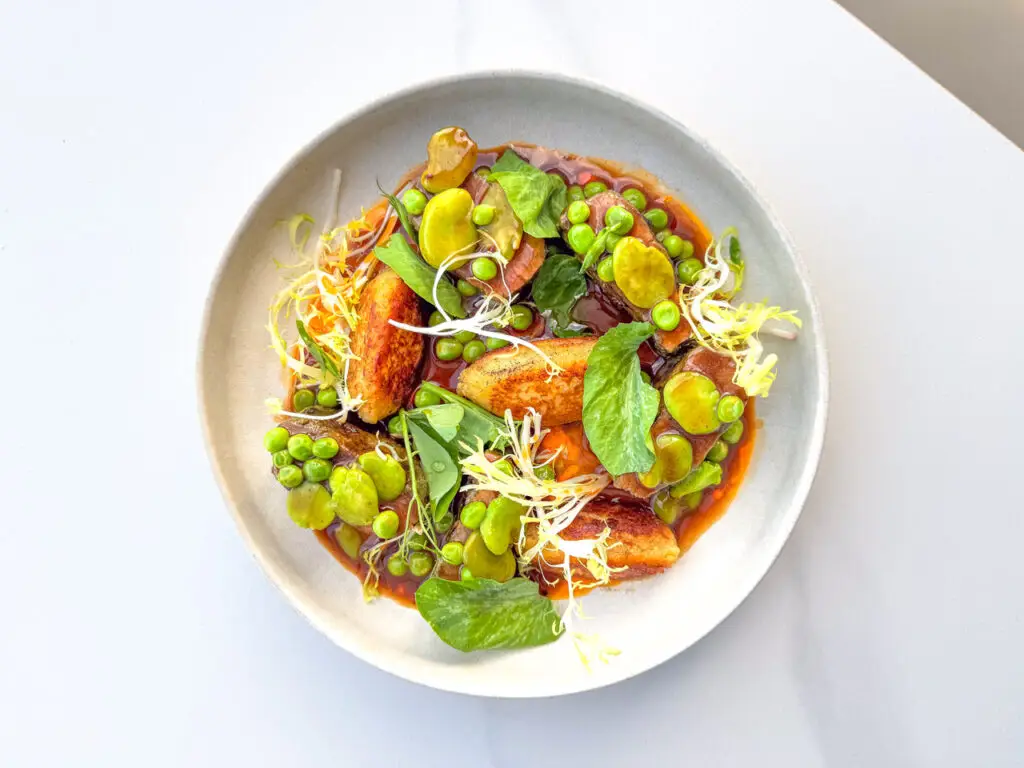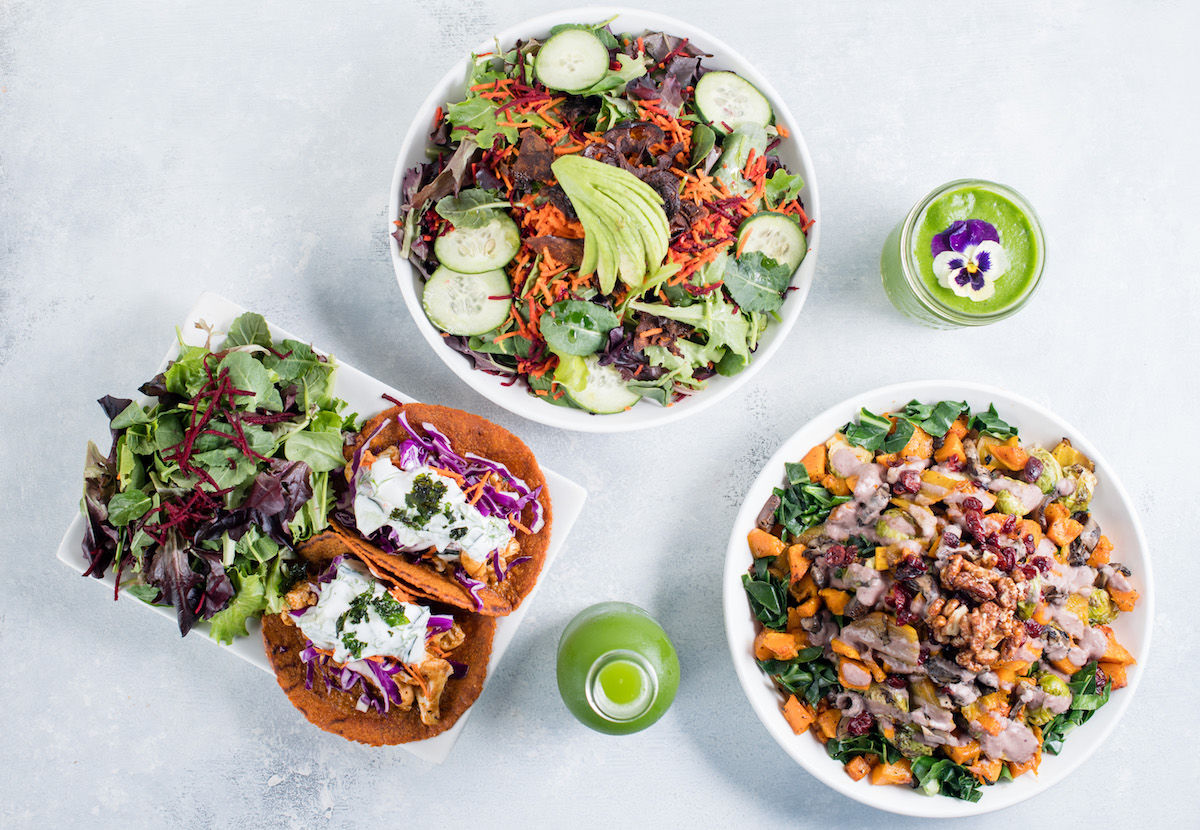I see Claire digging around in there. She’s excavating in a very serious way. This is all that matters for the next ten seconds of her life. She moves the pile of lettuce to the left, then moves the heap to the right. Finally, she unearths what appears to be a small orb of granola, with protruding seeds and harrowing flashbacks to 1970s homemade hippie snacks.
“That’s it?” she groans, feeling duped. “That’s the ‘SUPERFOOD Salad’? It’s just some lettuce with a rock in it.”
This was the second such “superfood” salad or bowl we’d been suckered into purchasing over the last two days. The year is young, our virtue still high. Donuts will have their moment in April, but for now we are beings of light. And each time, what we got was pretty underwhelming—what our forebears might’ve just called “a salad.”
So I started to write a story about superfood fraud—how restaurants are just slapping that word on a dish and serving a glorified bowl of lettuce with a little quinoa and hemp seeds sprinkled in. “Superfood” bowls and/or salads are popping up all across the city, like Easter eggs for the phytonutrient generation. I have no problem with their existence or ubiquity. I get why we want to eat better. Because our parents raised us thinking Diet Coke was health food. Then we learned that stuff kills you (though, to its credit, also unclogs drains). Now that the U.S. is finally emerging from the dark days of processed food—hazy with chemical stabilizers, spackled with preservatives, our bodies turgid with inflammation—we’re swinging the pendulum far, far the other way.
“Most of the research into the nutrition of certain foods is paid for by the producers of those foods.”
So it’s understandable that we’re no longer content with berries. They’ve got to be superberries, which media claims were grown by nature specifically to hunt cancer cells like Liam Neeson would. No more iceberg lettuce. Our favorite social media wellness influencer has told us we need superlettuce, which speeds up our metabolism. Forget sunflower seeds—superseeds will eradicate heart disease and get you 1,000 Instagram followers.
As I researched superfoods, I was reminded of the bigger truth—the one I’ve known all along, but temporarily forgot to be inflamed and enraged about.
“Superfood” is a supersham. It’s a meaningless marketing word slapped on fruits and veggies and seeds and a few fish by marketing executives to sell more fruits and veggies and seeds and fish. There is little to no good science to back up the health claims, and the research that does was paid for by—you guessed it, the producers of blueberries, goji berries, cacao, acai, avocados, kimchi, almonds, garlic, green tea, kale, kefir, pomegranate, and wheatgrass.
I’d say “there, I said it,” but I’m nowhere near the first and it’s hardly a bold, rogue claim.
“Acai is a berry, not a life coach.”
I feel almost bad or irresponsible saying this, though. Junk food makers have been using this sleight of hand for decades (“Lucky Charms are part of a nutritious breakfast,” sure, but the nutritious part is sure as hell not the Lucky Charms). We have been eating deep-fried, over-salted, butter-shellacked, sugar-spiked frankenfood for decades. Why not just let marketers of healthy, real food use the same unfounded advertising hyperbole for a bit? If it gets Americans to eat better and maybe lowers the 39.8 percent obesity rate, that’s a good thing, right?
Well, yes. And no. For a couple reasons. First, it creates a false “silver bullet” paradigm of nutrition and health: Yes, you smoked a pack of Parliaments last night, but our hemp seeds got your back. Second, it artificially drives up the cost of these foods. That $20 superfood salad is probably only marginally healthier, or not healthier at all, than a regular salad. If not for the “superfood” claim, you could’ve been just as virtuous and not so broke. There’s third and fourth and fifth points (see the links at the bottom of this article).
We’re just slapping “super” on “foods” and pretending they’ve got magical powers now. You wouldn’t just put your very average friend in a cape and push him off the side of a building assuming he could fly. The assignation is dubious. Your friend will splat, and so will the reaction to your “superfood bowl.”
A blueberry is certainly a far better choice than a Sour Patch Kid. These are healthy, whole foods. The best science suggests we should eat them often. But acai is a berry, not a life coach.
Apparently not even the restaurants themselves know this. When I posted a Facebook complaint about the lack of superfood in a “Superfood Bowl” at a local restaurant, they responded by saying, “6 out of 8 ingredients are classified as superfoods.”
Classified by whom? There is no official classification for “superfoods,” according to the American Heart Association. And that’s the problem. Articles on the internet are not official classifications, but we’ve come to take their headlines as official medical advice.
After reading dozens of studies and research into the subject, the best advice from experts seems to be the same as it’s always been—eat as many different fruits, veggies, and whole grains as possible, and minimize your meat intake.
PARTNER CONTENT
A few more points and links to articles for further reading:
- The first use of “superfood” was probably in this advertisement for bananas around WWI.
- Blueberries are so famous as a superfood because the USDA once devised a test to measure the antioxidant levels of various foods. Blueberries (and kale) came out on top. Maine Wild Blueberries spent millions marketing that fact. Then the USDA rescinded the study and the list due to further research suggesting it had no bearing on health. But most of us still believe blueberries are the most antioxidantally powerful food on the planet.
- Still, according to Mintel research, in 2015 there was a 36% increase globally in the number of foods and beverages launched that were labeled as a “superfood,” “superfruit,” or “supergrain,” with the U.S. leading those product launches, naturally.
- Most nutritional research is paid for by the food companies themselves, which presents all sorts of ethical issues and questions about the veracity of the findings.
- You can also eat too much of a nutrient, which can block your body’s ability to uptake other vital nutrients.
At the end of the day, the science of antioxidants and their effect on the body is byzantine and wild and still not understood. Until it is, eat healthy but don’t buy the hype.




















